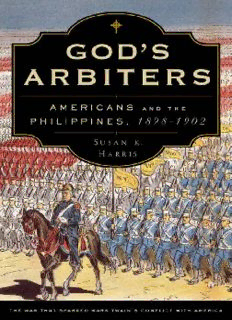
God's Arbiters: Americans and the Philippines, 1898-1902 (Imagining the Americas) PDF
Preview God's Arbiters: Americans and the Philippines, 1898-1902 (Imagining the Americas)
God’s Arbiters IMAGINING THE AMERICAS Caroline F. Levander and Anthony B. Pinn, Series Editors Imagining the Americas is a new interdisciplinary series that explores the cross-fertilization among cultures and forms in the American hemisphere. The series targets the intersections between literary, religious and cultural studies that materialize once the idea of nation is understood as fl uid and multi-form. Extending from the northernmost regions of Canada to Cape Horn, books in this series will move beyond a simple extension of U.S.-based Ameri- can studies approaches and engage the American hemisphere directly. Millennial Literatures of the Americas, 1492–2002 Thomas O. Beebee The Plantation in the Postslavery Imagination Elizabeth Christine Russ The Interethnic Imagination Caroline Rody Religious Liberties Elizabeth Fenton Between the Lines Monique-Adelle Callahan God’s Arbiters Susan K. Harris God’s Arbiters Americans and the Philippines, 1898–1902 Susan K. Harris Oxford University Press, Inc., publishes works that further Oxford University’s objective of excellence in research, scholarship, and education. Oxford New York Auckland Cape Town Dar es Salaam Hong Kong Karachi Kuala Lumpur Madrid Melbourne Mexico City Nairobi New Delhi Shanghai Taipei Toronto With offi ces in Argentina Austria Brazil Chile Czech Republic France Greece Guatemala Hungary Italy Japan Poland Portugal Singapore South Korea Switzerland Thailand Turkey Ukraine Vietnam Copyright © 2011 by Susan K. Harris Published by Oxford University Press, Inc. 198 Madison Avenue, New York, New York 10016 www.oup.com Oxford is a registered trademark of Oxford University Press All rights reserved. No part of this publication may be reproduced, stored in a retrieval system, or transmitted, in any form or by any means, electronic, mechanical, photocopying, recording, or otherwise, without the prior permission of Oxford University Press. Library of Congress Cataloging-in-Publication Data Harris, Susan K., 1945– God’s arbiters : Americans and the Philippines, 1898–1902 / by Susan K. Harris. p. cm. — (Imagining the Americas) Includes bibliographical references and index. ISBN 978-0-19-974010-9 (cloth : alk. paper) 1. United States—Foreign relations—Philippines. 2. Philippines—Foreign relations—United States. 3. Philippines—Annexation to the United States. 4. Philippines—Foreign public opinion, American. 5. Racism—Political aspects—United States—History. 6. United States—Colonial question. 7. United States—Territorial expansion. 8. Political messianism—United States—History. 9. Christianity and politics—United States—History. 10. Imperialism—History. I. Title. E183.8.P5H37 2011 327.730599—dc22 2010035133 1 3 5 7 9 8 6 4 2 Printed in the United States of America on acid-free paper The founders of the nation were not provincial. Theirs was the geography of the world. They . . . knew that where our ships should go our fl ag might follow. They had the logic of progress, and they knew that the Republic they were planting must, in obedience to the laws of our expanding race, necessarily develop into the greater Republic which the world will fi nally acknowledge as the arbiter, under God, of the destinies of mankind. —Senator Albert Beveridge, January 9, 1900 This page intentionally left blank When I . . . realized that the Philippines had dropped into our laps I confess I did not know what to do with them. . . . I walked the fl oor of the White House night after night until midnight; and I am not ashamed to tell you, gentlemen, that I went down on my knees and prayed Almighty God for light and guidance. . . . And one night late it came to me this way . . . (1) That we could not give them back to Spain—that would be cowardly and dishonorable; (2) that we could not turn them over to France and Germany—our com- mercial rivals in the Orient—that would be bad business and discreditable; (3) that we could not leave them to themselves—they were unfi t for self-government—and they would soon have anarchy and misrule over there worse than Spain’s was; and (4) that there was nothing left for us to do but to take them all, and to educate the Filipinos, and uplift and civilize and Christianize them, and by God’s grace do the very best we could by them, as our fellow-men for whom Christ also died. —President William McKinley, “Interview,” circa 1900, Reported by General James Rusling, 1903 I bring you the stately matron called CHRISTENDOM—returning bedraggled, besmirched and dishonored from pirate raids in Kiaochow, Manchuria, South Africa and the Philippines; with her soul full of meanness, her pocket full of boodle and her mouth full of pious hypocri- sies. Give her soap and a towel, but hide the looking-glass. —Mark Twain, “A Salutation to the Twentieth Century,” December 31, 1900 This page intentionally left blank TABLE OF CONTENTS Acknowledgments xi Introduction: A Christian Nation 3 Section I : American Narratives 1 . Citizenship and the Philippines Debates: The Religious Factor 41 2 . Citizenship and the Philippines Debates: The Racial Factor 62 Section II : Creating Citizens 3 . A Connecticut Yankee in the Philippines 85 4 . The National Christian 104 Section III : The Eyes of the World 5 . “The White Man’s Burden,” the Philippines, and the Anglo-American Alliance 129 6 . Saxon Eyes and Barbaric Souls: Responses to the American Annexation of the Philippines in Europe and Latin America 154 7 . Noli Me Tangere: Filipino Responses to Annexation 178 Epilogue 197 Notes 205 Bibliography 235 Index 249
Description: